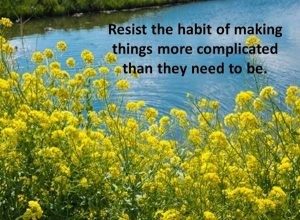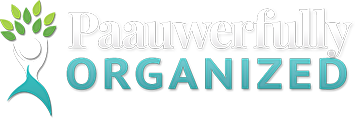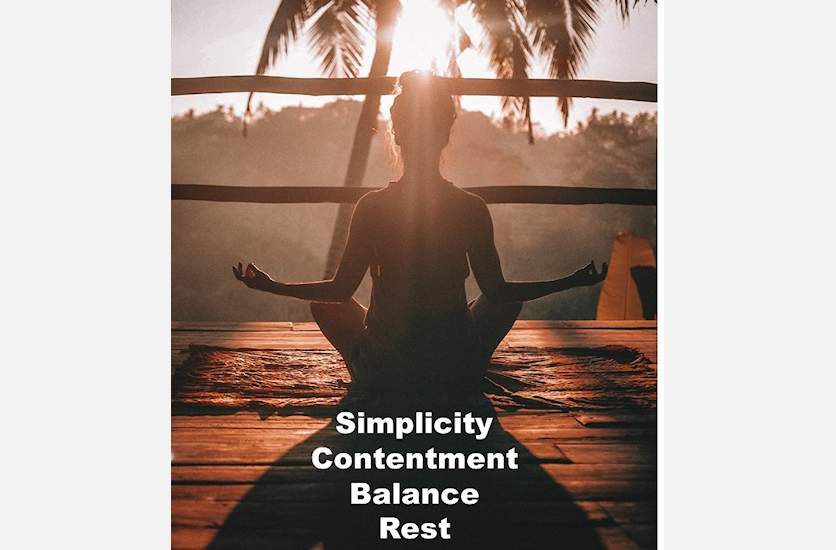In my last blog, I shared some wisdom I’ve gained with age: Practicing Self-care is Not Selfish…It’s Responsible! This week we’ll explore four essential building blocks for practicing self-care while creating some margin in your life.
“Margin is the space that exists between ourselves and our limits. It is the amount allowed beyond that which is needed. It is something held in reserve for contingencies or unanticipated situations. Margin is the gap between rest and exhaustion, the space between breathing freely and suffocating.”
– Dr. Richard Swenson
Building Block #1: Seek Simplicity
To simplify your life, become crystal clear about your goals, and then do the following:
- Identify what you are willing to take on in order to reach your goals.
 Identify what you are willing to let go of.
Identify what you are willing to let go of.- Identify activities that are all-consuming but not necessarily important to you. In this case, less is more – doing less of what is not important enables you to do more of what matters most.
- Let go of relationships that do not enhance your life.
- Let go of possessions that do not enhance your life on a regular basis–things that take up space, require maintenance and make decision-making more complicated. For tips on how to make decisions, register for my free Buried in Paper webinar.
- Let go of important tasks that someone else can do by delegating them.
- Let go of petty annoyances. Make a list of 10 things in your life that bother you. Then give yourself a month to fix it, clean it, toss it, or let go of it! For a deeper dive, check out my RAM Dump exercise.
- Let go of the past. Imagine where you want to be in the future and move toward it.
I like to regularly give away something that I no longer love or need. As we get older, accumulating too much stuff can weigh us down. Sometimes things that are not loved or needed are kept because of guilt or shame. Perhaps your favorite aunt gave you a gift you don’t enjoy or left her household furnishings to you in her will. I would like to think that I have not given gifts to others with an expectation that they must be kept forever. I want the recipient to enjoy the gift or feel free to let it go.
Part of self-care is to recognize that there is a cost to keeping everything. Your job is to decide if you are willing to pay the cost in time, space, energy, and money. If you are keeping it for your kids or grandkids, check with them first. The younger generations do not want our stuff, regardless of how “valuable” you think it is. No matter how much money you once paid, value is in the eye of the beholder.
Building Block #2: Cultivate Contentment
Contentment is something we learn. It is a relative state. Comparing is the enemy of contentment. “Having it all” may not be in your best interest!
Consider these questions when making decisions about activities, purchases, or relationships:
 Will this activity enhance my life?
Will this activity enhance my life?- Will this purchase add meaning and fulfillment to my life a month from now? How about a year from now? If I don’t purchase this, will I regret it later? If I decide to purchase this later, will it still be available?
- Will this relationship move me toward or away from who I want to be and what I want to do or have in my life?
Building Block #3: Bring Balance
The way you use your time reflects the way you live your life. Life is like a buffet line — our plates fill up sooner than we realize. We need to learn how to say no. NO is a complete sentence. If you need help with this, check out my blog, The NOT To-Do List.
 Finding balance is not a state we can get to or arrive at because it is always in motion. Balance is dynamic. It only exists in the midst of action. We are moving toward balance or away from it. Balance requires consistent, conscious, and controlled motion. Try balancing on one foot. Notice the fine adjustments you need to make in the foot and body in order to maintain equilibrium.
Finding balance is not a state we can get to or arrive at because it is always in motion. Balance is dynamic. It only exists in the midst of action. We are moving toward balance or away from it. Balance requires consistent, conscious, and controlled motion. Try balancing on one foot. Notice the fine adjustments you need to make in the foot and body in order to maintain equilibrium.
Being out-of-balance is the condition of being driven by circumstances without a sense of any choice. When choice is gone, balance is gone, and with it goes the possibility of personal fulfillment.
To create balance in your life, consider the following:
- Do you feel at choice in your life, or do you allow victim language such as I can’t…, I gotta.., I have to…, or I should… to dictate your life?
- Schedule a weekly planning time by yourself to plan the coming week, based on what you choose. While you are doing your planning, remember that every time you say “yes” to someone or something, you are also saying “no” to someone or something else.
- Identify the key relationships or roles in your life. What activities do you choose for the coming week to nurture each of these relationships or roles that are important to you?
- Begin your weekly planning by choosing activities that nurture your physical, spiritual, mental, and social well-being. Caring for yourself first will help you be more available to serve in each of your chosen roles without feeling angry or resentful.
- For a more in-depth look at the weekly planning process, I invite you to access my free webinar, Managing Priorities.
Building Block #4: Restore Rest
Can you imagine what music would be like with no rests? Try humming a familiar tune without honoring the rests, and you’ll soon recognize their value.
“If you’re burning the candle at both ends, you’re not as bright as you think you are.” –Anonymous
 Wayne Muller, author of Sabbath: Restoring the Sacred Rhythm of Rest, has the following to say about rest: “In the relentless busyness of modern life, we have lost the rhythm between action and rest. The busier we are, the more important we seem to ourselves and, we imagine, to others. To be unavailable to our friends and family, to be unable to find time for the sunset (or even to know the sun has set), to whiz through our obligations without time for a single mindful breath–this has become the model of a successful life. Because we do not rest, we lose our way. We miss the compass points that show us where to go, the nourishment that gives us succor, the quiet that gives us wisdom.”
Wayne Muller, author of Sabbath: Restoring the Sacred Rhythm of Rest, has the following to say about rest: “In the relentless busyness of modern life, we have lost the rhythm between action and rest. The busier we are, the more important we seem to ourselves and, we imagine, to others. To be unavailable to our friends and family, to be unable to find time for the sunset (or even to know the sun has set), to whiz through our obligations without time for a single mindful breath–this has become the model of a successful life. Because we do not rest, we lose our way. We miss the compass points that show us where to go, the nourishment that gives us succor, the quiet that gives us wisdom.”
Restore rest in your life by trying these ten tips:
- Identify one day a week on which you choose not to conduct any business — no professional meetings or calls, correspondence, checking for messages or e-mail, etc. Many people choose Saturday or Sunday for their day of rest.
- Plan something to rejuvenate yourself — perhaps a massage, bubble bath, listening to relaxing music, or losing yourself in a good book.
- Breathe deeply. When running on adrenaline, we have a tendency towards shallow breathing. When we deprive our bodies of oxygen, we experience such things as cold hands, high blood pressure, and feeling anxious.
- Take an early afternoon nap. Daniel Pink has just published a book called When: The Scientific Secrets of Perfect Timing. In his book, he cleverly outlines the 5 Secrets to Taking the Perfect Nap.
- A brisk walk is one of the best things you can do to reduce stress and restore health to your adrenal system. Skip strenuous exercise after 5 PM.
- Limit your sugar intake, and avoid heavy meals late at night. Stop caffeine intake after 2 PM.
- Stick to one glass of wine with dinner and avoid all alcohol close to bedtime. Although alcohol may relax you or make you feel sleepy, it can interfere with REM sleep, which is important to getting restful sleep, learning new information, and maintaining important neural pathways.
- Determine the number of hours of sleep you need for optimal functioning. Create a plan to help you get the rest you need.
- Cut out all screen viewing – computers, tablets, smartphones, television — within one hour of bedtime. The light interferes with melatonin production, which is a known sleep aid.
- Jot down your to-do list before going to bed so you don’t lay awake stressing about something that needs to be done.
What needs to shift in order to create white space in your life?
If you’d like support practicing self-care by cultivating simplicity, contentment, balance and rest, let’s schedule a no-cost, no-pressure Discovery Call today. Together we can create some margin in your life.
Additional Resources:
- Blog: The NOT To-Do List
- Blog: RAM Dump
- Blog: How Mary Transitioned Through Major Life Changes and Reinvented Herself in One Year
- Blog: Balance Your Life: Environment #3 – Self
- Blog: Love Yourself First
- Book: The Art of Extreme Self-Care
- Book: Sabbath: Restoring the Sacred Rhythm of Rest
- Book: When: The Scientific Secrets of Perfect Timing
- Book: Margin: Restoring Emotional, Physical, Financial, and Time Reserves to Overloaded Lives
- Guide: Cultivating Happiness: Living Life on Your Terms
- Free Webinar: Managing Priorities

Life Architect – Creating Blueprints for Purposeful & Productive Lives
Kathy@OrgCoach.net www.OrgCoach.net Follow me on Facebook





